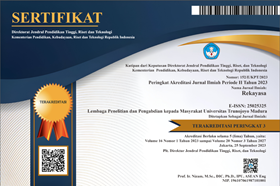Aplikasi Metode Regresi Untuk Analisis Variabel Moderasi pada Personel Organisasi Militer
Abstract
The achievement of the vision, mission and also the target of a military institution is strongly influenced by soldiers or personnel who are human resource capital. In terms of human resources or personnel, of course, they have work motivation that must be maintained in order to survive in military organizations. Potential human resources and in accordance with their field of work will support the achievement of the organization if they are utilized optimally. This study aims to find answers about how the influence of organizational culture (X1) and job satisfaction (X2) on the work motivation of military personnel (Y) with work facilities as moderating variables (X3). The scientific method used in this research is survey research using a quantitative approach, the data analysis carried out in this study by analysis using statistical model tests. The results obtained in this study are (a) Organizational culture (X1) has a significant effect on work motivation (Y) in Institutions or Military Organizations, (b) Job satisfaction (X2) has a significant effect on work motivation (Y) in Institutions or Organizations. Military, and (c) Work facilities (X3) have a significant effect on work motivation (Y) in Military Institutions or Organizations. Based on the test results, it is also known that there is an effect of these variables after interacting with the work facilities variable as a moderating variable, the results obtained that have a significant effect on the work motivation of personnel. So it can be concluded that work facilities moderate organizational culture and job satisfaction so that it affects the increase in work motivation in military institutions or organizations.
Keywords
Full Text:
PDF (Bahasa Indonesia)References
Bandono, A., Bastari, A., & Suharyo, O. S. (2020). Effectiveness Naval Collaboration Flexible Learning (NCFL) Model in Increasing Learning Outcomes The Indonesian Naval Technology College. International Journal of Progressive Sciences and Technologies, 23(2), 434-442.
Bandono, A., Rahman, A., & Suharyo, O. S. (2020). The Application Model of Naval Collaboration Flexible Learning (NCFL) in the Indonesian Naval Technology College: A Case Study. International Journal of Progressive Sciences and Technologies, 23(2), 598-605.
Al-Musadieq, M., Nurjannah, N., Raharjo, K., Solimun, S., & Fernandes, A. A. R. (2018). The mediating effect of work motivation on the influence of job design and organizational culture against HR performance. Journal of Management Development.
Cronley, C., & kyoung Kim, Y. (2017). Intentions to turnover: Testing the moderated effects of organizational culture, as mediated by job satisfaction, within the Salvation Army. Leadership & Organization Development Journal.
Dirani, K. M. (2009). Measuring the learning organization culture, organizational commitment and job satisfaction in the Lebanese banking sector. Human Resource Development International, 12(2), 189-208.
Egan, T. M., Yang, B., & Bartlett, K. R. (2004). The effects of organizational learning culture and job satisfaction on motivation to transfer learning and turnover intention. Human resource development quarterly, 15(3), 279-301.
Lok, P., & Crawford, J. (2004). The effect of organisational culture and leadership style on job satisfaction and organisational commitment: A cross‐national comparison. Journal of management development.
MacIntosh, E. W., & Doherty, A. (2010). The influence of organizational culture on job satisfaction and intention to leave. Sport Management Review, 13(2), 106-117.
Nugroho, S. H., & Pudiastuti, E. T. (2021). Analysis Of Organizational Performance Through Transformational Leadership And Organizational Culture. JOURNAL ASRO, 12(01), 46-55.
Nugroho, S. H., & Afifah, S. (2021). The Relationship Of Organizational Justice And Job Embeddedness On Turnover Intention With Mediation Of Organizational Commitment. International Journal of Progressive Sciences and Technologies, 29(1), 335-346.
Nugroho, S. H. (2022). The role of human resources management in organizational perspective. Global Journal of Engineering and Technology Advances, 10(03), 012-018.
Nugroho, S. H. (2022). Human Resources Management In Improving Performance And Motivation Of Personnel By Reward System. International Journal of Progressive Sciences and Technologies, 31(1), 169-174.
Pawirosumarto, S., Sarjana, P. K., & Gunawan, R. (2017). The effect of work environment, leadership style, and organizational culture towards job satisfaction and its implication towards employee performance in Parador Hotels and Resorts, Indonesia. International journal of law and management.
Robbins,Stephen P. and Coulter, Mary. 2012. Management. New Jersey: Pearson Education, Inc. Alih Bahasa: Tita Maria Larista.
Suharyo, O. S., Prabowo, A. R., & Winoelyo, M. (2022). Assessment of ship accident risk in the east Surabaya shipping channel using formally safety assessment method. Global Journal of Engineering and Technology Advances, 10(01), 022-032.
Soeters, J. L., Winslow, D. J., & Weibull, A. (2006). Military culture. In Handbook of the Sociology of the Military (pp. 237-254). Springer, New York, NY.
Zahari, I. B., & Shurbagi, A. M. A. (2012). The effect of organizational culture and the relationship between transformational leadership and job satisfaction in petroleum sector of Libya. International Business Research, 5(9), 89.
DOI
https://doi.org/10.21107/rekayasa.v15i2.15505Metrics
Refbacks
- There are currently no refbacks.
Copyright (c) 2022 Adi Bandono

This work is licensed under a Creative Commons Attribution-ShareAlike 4.0 International License.
























